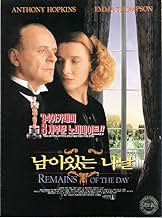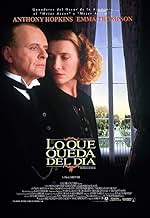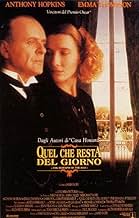Un majordome qui s'est sacrifié corps et âme au service de son employeur, un lord anglais, dans les années précédant la Seconde Guerre mondiale se rend compte trop tard combien sa loyauté ét... Tout lireUn majordome qui s'est sacrifié corps et âme au service de son employeur, un lord anglais, dans les années précédant la Seconde Guerre mondiale se rend compte trop tard combien sa loyauté était mal avisée.Un majordome qui s'est sacrifié corps et âme au service de son employeur, un lord anglais, dans les années précédant la Seconde Guerre mondiale se rend compte trop tard combien sa loyauté était mal avisée.
- Réalisation
- Scénario
- Casting principal
- Nommé pour 8 Oscars
- 17 victoires et 42 nominations au total
Abigail Hopkins
- Housemaid
- (as Abigail Harrison)
Avis à la une
Excellent film that was overlooked in 1993 due to the dominance of "Schindler's List", "The Remains of the Day" is an exquisite film which examines the relationship between two servants in England (Anthony Hopkins and Emma Thompson, both Oscar-nominated). They both definitely have feelings for each other, but both seem to be bound by duty, honor, and society. Hopkins is not the type of person who shares his inner-most feelings with anyone and Thompson wants to share her hidden love for Hopkins, but is frightened for various reasons. The fact that the film is told during flashbacks which took place just before the involvement of England in World War II just makes everything that much more interesting and heart-wrenching. During the present-day of the movie it appears that Hopkins and Thompson will finally proclaim their love for one another, but in the end that is not even a real certainty. Ruth Prawer Jhabvala's adaptation of the novel is exceptional and James Ivory's direction has rarely been better or more focused. With all this said, it is Hopkins and Thompson that dominate the action and make "The Remains of the Day" one of the best films of the 1990s. 5 stars out of 5.
Dutiful butler Stevens serves his master Lord Darlington diligently, obediently, without question, until he realises one day that his devout duty to the natural order of things, may have been wrong.
A string of Oscar nominations, and not a single win, and then you realise what the competition was, Schindler's list, if only this film had been released a year either side, it may have done very well.
It runs for just over the two hour mark, but somehow feels longer, I don't mean that as a negative, simply because there seems to be so much content, it's so deep and absorbing.
Some may argue it's a little heavy, and I would agree, it is quite a heavy going film, but it's engrossing, and does have a few lighter moments, I'd have loved to overhear the conversation about the birds and the bees, you can only imagine.
A tour de force from the legendary Anthony Hopkins, surely one of the best performances of all time? His delivery is exquisite, there isn't a single point where you don't thoroughly believe in his character, that moment where he learns of his father's fate, but carries on with his duties, it's incredible.
Tha way the story is told is terrific, it moves backwards and forwards somewhat, but it isn't hard to keep up with, some films leave you baffled, there isn't a single sense of that here. It's a war film of sorts, but told from a very unique view point.
The cinematography is unbelievable, the visuals are striking, there's an atmosphere and an intimacy about the way it's shot, it's remarkable.
Hopkins, as I've mentioned is remarkable, but the likes of Emma Thompson, Hugh Grant, James Fox and Peter Vaughan are all outstanding.
10/10.
A string of Oscar nominations, and not a single win, and then you realise what the competition was, Schindler's list, if only this film had been released a year either side, it may have done very well.
It runs for just over the two hour mark, but somehow feels longer, I don't mean that as a negative, simply because there seems to be so much content, it's so deep and absorbing.
Some may argue it's a little heavy, and I would agree, it is quite a heavy going film, but it's engrossing, and does have a few lighter moments, I'd have loved to overhear the conversation about the birds and the bees, you can only imagine.
A tour de force from the legendary Anthony Hopkins, surely one of the best performances of all time? His delivery is exquisite, there isn't a single point where you don't thoroughly believe in his character, that moment where he learns of his father's fate, but carries on with his duties, it's incredible.
Tha way the story is told is terrific, it moves backwards and forwards somewhat, but it isn't hard to keep up with, some films leave you baffled, there isn't a single sense of that here. It's a war film of sorts, but told from a very unique view point.
The cinematography is unbelievable, the visuals are striking, there's an atmosphere and an intimacy about the way it's shot, it's remarkable.
Hopkins, as I've mentioned is remarkable, but the likes of Emma Thompson, Hugh Grant, James Fox and Peter Vaughan are all outstanding.
10/10.
Impeccably cast and produced in typical Merchant-Ivory manner, this understated drama features superb performances by two of the finest actors in modern cinema, Anthony Hopkins and Emma Thompson. Both an acid indictment of the British class system and an unflinching portrayal of a man who in the end cannot transcend his largely self-imposed limitations, the film is both fascinating and agonizing to watch and its cumulative emotional impact will stay with you long after it's over.
There is an exquisite moment near the finale when Thompson's character bares only slightly a hint of the feelings she has for Hopkins, an allusion to what might have been between them. And Hopkins, in his consummate skill, maintains in both facial and vocal expressions the most non-committal of replies; his face a mask of bland affability but his eyes dark with the knowledge that he is a dead man who has wasted his life. With no outward show of emotion, the scene is devastating.
THE REMAINS OF THE DAY may not be a happy film, but it is a memorable and powerful one.
There is an exquisite moment near the finale when Thompson's character bares only slightly a hint of the feelings she has for Hopkins, an allusion to what might have been between them. And Hopkins, in his consummate skill, maintains in both facial and vocal expressions the most non-committal of replies; his face a mask of bland affability but his eyes dark with the knowledge that he is a dead man who has wasted his life. With no outward show of emotion, the scene is devastating.
THE REMAINS OF THE DAY may not be a happy film, but it is a memorable and powerful one.
This is, in my opinion, the finest film in the Merchant Ivory canon. And to hail it as such is to grossly undersell it. It is not only that but also the best story of unrequited love in cinema history, and a masterpiece of understated emotion. It also boasts some of the finest performances ever put on film, most notably from the peerless Anthony Hopkins.
Then again, understatement is the key to this film. Writer Ruth Prawer Jhabvala and Director James Ivory adapt Kazuo Ishiguro's poignant novel with such delicacy that it gets under ones skin in a deeply profound way difficult to express in a few words.
The plot opens in the 1950's as meticulous and emotionally repressed butler Stevens (Anthony Hopkins) reviews a lifetime of service in Darlington Hall. The story flashes back to the 1930's where Stevens formed a close friendship with housekeeper Miss Kenton (Emma Thompson). This relationship grew slowly over several years and ultimately the pair developed romantic feelings for one another, although neither admitted it. Whilst all this was happening, Steven's employer Lord Darlington (Edward Fox) gradually became a misguided Nazi sympathiser in pre-war Europe. Unfortunately, loyalty to his master caused Stevens to reject the delicate advances of Miss Kenton. History took its inevitable course, and Darlington's involvement in appeasement contributed to the outbreak of World War II. Now Stevens realises he made a mistake and wants to make amends.
To describe Anthony Hopkins as brilliant is completely redundant. His turn here goes way beyond mere acting, and it was criminal he was denied the Oscar at the 1994 Academy awards. Stevens absurdly repressed personality gently takes the audience from laughter to tears in the most emotionally devastating finale I have ever seen. Hopkin's mesmerising performance is matched by a career-best turn from Emma Thompson. The supporting cast is uniformly superb, including a pre-Four Weddings Hugh Grant and Christopher Reeve in one of his last roles before the accident that paralysed him.
Needless to say, the cinematography, music, editing and art direction are immaculate. The understated beauty of the English countryside that was so important to the book translates brilliantly to film here.
This is a lovely, melancholic film, which effortlessly embraces complex themes such as misguided loyalty, dignity, pride, wasted lives, and unrequited love. It would be all too much to bear if it weren't for the film's genuine good-humoured understanding of English culture (all the more remarkable for having been initially penned by a Japanese author). In fact, humour is an important element in the film. There are many laugh-out-loud moments, which make the tragic part of the story all the more real and poignant. All in all, The Remains of the Day is a milestone film an unforgettable tragedy of a man who pays the terrible price of denying his own feelings.
Then again, understatement is the key to this film. Writer Ruth Prawer Jhabvala and Director James Ivory adapt Kazuo Ishiguro's poignant novel with such delicacy that it gets under ones skin in a deeply profound way difficult to express in a few words.
The plot opens in the 1950's as meticulous and emotionally repressed butler Stevens (Anthony Hopkins) reviews a lifetime of service in Darlington Hall. The story flashes back to the 1930's where Stevens formed a close friendship with housekeeper Miss Kenton (Emma Thompson). This relationship grew slowly over several years and ultimately the pair developed romantic feelings for one another, although neither admitted it. Whilst all this was happening, Steven's employer Lord Darlington (Edward Fox) gradually became a misguided Nazi sympathiser in pre-war Europe. Unfortunately, loyalty to his master caused Stevens to reject the delicate advances of Miss Kenton. History took its inevitable course, and Darlington's involvement in appeasement contributed to the outbreak of World War II. Now Stevens realises he made a mistake and wants to make amends.
To describe Anthony Hopkins as brilliant is completely redundant. His turn here goes way beyond mere acting, and it was criminal he was denied the Oscar at the 1994 Academy awards. Stevens absurdly repressed personality gently takes the audience from laughter to tears in the most emotionally devastating finale I have ever seen. Hopkin's mesmerising performance is matched by a career-best turn from Emma Thompson. The supporting cast is uniformly superb, including a pre-Four Weddings Hugh Grant and Christopher Reeve in one of his last roles before the accident that paralysed him.
Needless to say, the cinematography, music, editing and art direction are immaculate. The understated beauty of the English countryside that was so important to the book translates brilliantly to film here.
This is a lovely, melancholic film, which effortlessly embraces complex themes such as misguided loyalty, dignity, pride, wasted lives, and unrequited love. It would be all too much to bear if it weren't for the film's genuine good-humoured understanding of English culture (all the more remarkable for having been initially penned by a Japanese author). In fact, humour is an important element in the film. There are many laugh-out-loud moments, which make the tragic part of the story all the more real and poignant. All in all, The Remains of the Day is a milestone film an unforgettable tragedy of a man who pays the terrible price of denying his own feelings.
Ishiguro's story of duty finds career butler Mr Stevens preparing to meet Miss Kenton, once the head maid in his household. They have not seen each other for 15 years and once had an unspoken love. As he journeys down to meet her he remembers a lifetime spent in quiet, honourable service.
I don't like period pieces. Merchant-Ivory stuff usually feels very false and stifled to me. Here I didn't know what to expect but I was blown away from start to finish. To say the story is about a romance isn't the whole picture, to say it's about British-German politics pre-WW2 is not the full story. In fact the film is about it all - but the focus is Mr Stevens. He serves dinner while his father dies in an upstairs room, he puts his own opinions so far back that he doesn't have any, he is so focused on the proper way to serve that he never finds his own life. To describe in like this makes it sound very dull, and to some people it may be, but trust me - the story is beautifully observed and has so much going on in the background that it'll keep you interested. The main reason it works is a faultless central performance by Hopkins.
Hopkins drives the whole film. His face and his speech reveal more about his inner feelings than anything else. It can be frustrating to see him always put on a brave face and bury his emotions, but once you get his character (a man of quiet honour, dignity and respect - any wonder he seems otherworldly by modern standards) it's fine. He is fantastic - I cannot say it enough. His lot in life is moving, but what is incredibly moving is that he seems content to let his life slide by. The scene where Thompson's Miss Kenton confronts him about the book he is quietly reading is beautiful, truly beautiful - revealing their closeness and the depth of Stevens' heart. Thompson is also excellent in her role but doesn't have as much screen time as Hopkins. Fox, Reeves and Chaplin are all excellent in their roles.
If the film has a weakness it is that it doesn't judge the rich - even the Nazi sympathisers. It almost seems to revere the elite - I know they are not the focus but Merchant-Ivory always seems to be obsessed with how the other half live (or maybe they are part of the other half!). The ending is also a little disappointing because it's quite low-key, but it's very, very touching.
Overall this is excellent - I didn't think it would be that good, but it totally blew me away. Sit down and let this story unfold before you, let the characters develop and ensnare you. I guarantee you will be deeply moved by Hopkins. The rather crude message of `seize the day' is beautifully told in a rich tapestry of one man's life.
I don't like period pieces. Merchant-Ivory stuff usually feels very false and stifled to me. Here I didn't know what to expect but I was blown away from start to finish. To say the story is about a romance isn't the whole picture, to say it's about British-German politics pre-WW2 is not the full story. In fact the film is about it all - but the focus is Mr Stevens. He serves dinner while his father dies in an upstairs room, he puts his own opinions so far back that he doesn't have any, he is so focused on the proper way to serve that he never finds his own life. To describe in like this makes it sound very dull, and to some people it may be, but trust me - the story is beautifully observed and has so much going on in the background that it'll keep you interested. The main reason it works is a faultless central performance by Hopkins.
Hopkins drives the whole film. His face and his speech reveal more about his inner feelings than anything else. It can be frustrating to see him always put on a brave face and bury his emotions, but once you get his character (a man of quiet honour, dignity and respect - any wonder he seems otherworldly by modern standards) it's fine. He is fantastic - I cannot say it enough. His lot in life is moving, but what is incredibly moving is that he seems content to let his life slide by. The scene where Thompson's Miss Kenton confronts him about the book he is quietly reading is beautiful, truly beautiful - revealing their closeness and the depth of Stevens' heart. Thompson is also excellent in her role but doesn't have as much screen time as Hopkins. Fox, Reeves and Chaplin are all excellent in their roles.
If the film has a weakness it is that it doesn't judge the rich - even the Nazi sympathisers. It almost seems to revere the elite - I know they are not the focus but Merchant-Ivory always seems to be obsessed with how the other half live (or maybe they are part of the other half!). The ending is also a little disappointing because it's quite low-key, but it's very, very touching.
Overall this is excellent - I didn't think it would be that good, but it totally blew me away. Sit down and let this story unfold before you, let the characters develop and ensnare you. I guarantee you will be deeply moved by Hopkins. The rather crude message of `seize the day' is beautifully told in a rich tapestry of one man's life.
Le saviez-vous
- AnecdotesSir Anthony Hopkins, as a guest on Actors Studio (1994), said that he got tips on how to play a butler from real-life butler Cyril Dickman, who served for fifty years at Buckingham Palace. Dickman said "There's nothing to being a butler, really; when you're in the room, it should be even more empty."
- GaffesAs the camera recedes in the final aerial shot departing from the estate, it briefly reveals a modern, silver-colored hatchback automobile backed up to the left end of the building.
- Citations
Miss Kenton: Why? Why, Mr. Stevens, why do you always have to hide what you feel?
- Bandes originalesBlue Moon
Composed by Richard Rodgers and Lorenz Hart
Meilleurs choix
Connectez-vous pour évaluer et suivre la liste de favoris afin de recevoir des recommandations personnalisées
- How long is The Remains of the Day?Alimenté par Alexa
Détails
- Date de sortie
- Pays d’origine
- Site officiel
- Langues
- Aussi connu sous le nom de
- Lo que queda del día
- Lieux de tournage
- Dyrham Park, Dyrham, Gloucestershire, Angleterre, Royaume-Uni(Darlington Hall: driveway and exterior of the Mansion)
- Sociétés de production
- Voir plus de crédits d'entreprise sur IMDbPro
Box-office
- Budget
- 15 000 000 $US (estimé)
- Montant brut aux États-Unis et au Canada
- 23 237 911 $US
- Week-end de sortie aux États-Unis et au Canada
- 1 528 982 $US
- 7 nov. 1993
- Montant brut mondial
- 23 240 144 $US
- Durée2 heures 14 minutes
- Couleur
- Rapport de forme
- 2.39 : 1
Contribuer à cette page
Suggérer une modification ou ajouter du contenu manquant





































